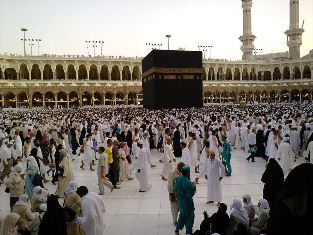 MECCA, Saudi Arabia (AP) -- Muslims from across the world descended on this holy city ahead of the annual hajj pilgrimage, many of them with prayers for a peaceful resolution to the wave of uprisings roiling the Arab world.
MECCA, Saudi Arabia (AP) -- Muslims from across the world descended on this holy city ahead of the annual hajj pilgrimage, many of them with prayers for a peaceful resolution to the wave of uprisings roiling the Arab world.
Some 2.5 million people are expected to take part in the five-day event that starts Saturday, Saudi authorities said. The pilgrimage focuses on Mecca, Islam's holiest site and the birthplace of the Prophet Muhammad.
This year's hajj takes place amid an unprecedented wave of anti-government protests in the Arab world that has toppled autocrats in Tunisia, Egypt and Libya. Uprisings have also shaken regimes in Yemen, Bahrain and Syria.
While hajj is a time to seek forgiveness for one's sins and meditate on the faith, the unrest across the region remained at the forefront of the minds of many pilgrims.
Adil Mohammed al-Saidi, who was making the pilgrimage from neighboring Yemen, said he hopes for a swift resolution to his country's 8-month uprising against President Ali Abdullah Saleh, who has ruled the impoverished nation for more than 30 years.
"The situation in Yemen is tragic and I pray to God to end this crisis very soon," said al-Saidi, 36, who has taken part in anti-government protests. "I hope that President Ali Abdullah Saleh, his forces and supporters put an end to this situation."
One of the bloodiest government crackdowns against protesters has been in Syria, where the U.N. says some 3,000 people have been killed since the revolt began in mid-March.
Khalaf Jumaa al-Hamidi, a 50-year-old father of five from Aleppo, Syria, said he has asked for peace in his homeland. "We pray to God that security be revealed in our country and other Islamic countries," he said.
While the uprisings in Yemen and Syria are still going strong, the civil war in Libya ended late last month with the capture and death of longtime dictator Moammar Gadhafi.
Youssef Issa Askar, 65, from Nalut, Libya, hailed the end of the Gadhafi regime and urged patience as the country's new rulers try to create a state out of the rubble of Gadhafi's rule.
"We lived 40 years of oppression, slavery and injustice," he said outside Mecca's Grand Mosque, with his identification card bearing the red, green and black flag of the revolution. "I'd like to address the Libyan people who were patient all these 40 years and tell them to be patient one or two more years so that the security be maintained and the situation be better."
Hajj is the oldest and most sacred ritual of Islam that every able-bodied Muslim who can financially afford the trip must perform once in a lifetime. The pious journey brings together the many nations that make up the 1.3 billion Muslims worldwide.
The pilgrimage is packed with symbolism and ritual aimed at cleansing the soul of sin and winning absolution by tracing the footsteps of the Prophet Mohammed and Abraham, whom Muslims view as a forefather of Islam.
It culminates when the pilgrims gather on Mount Arafat where the Prophet Mohammed is said to have given his last sermon 14 centuries ago. During the ritual Muslims believe God will grant whatever prayers they make.
Pilgrims then cast pebbles at three pillars that represent Satan in a symbolic rejection of temptation, a day that also marks the start of the Islamic holiday of Eid al-Adha, or feast of sacrifice, when Muslims around the world slaughter sheep and cattle in remembrance of Abraham's near-sacrifice of his son.
© 2011 The Associated Press. All rights reserved. This material may not be published, broadcast, rewritten or redistributed. Learn more about our Privacy Policy and Terms of Use.
Portland and Seattle
Free Subscription to Breaking News
Free Subscription to Breaking News




















































































































































































































































































































































